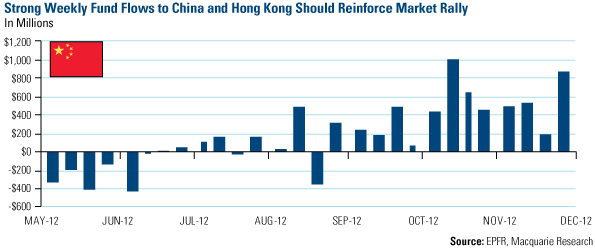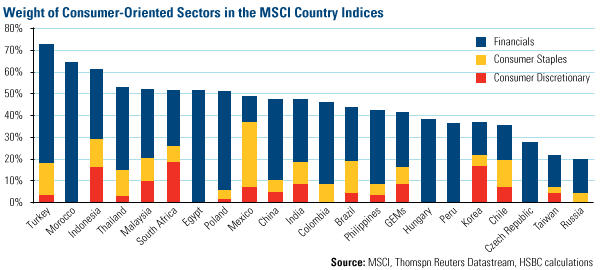Emerging Markets Radar (December 10, 2012)
Strengths
- Xi Jinping, the new leader for China, reiterated China will promote urbanization which the premier-in-waiting Li Keqiang identified as one of the main engines for the economic growth for the next decade. Shanghai Composite Index was up 4.12 percent for the week as domestic investors are building up their confidence that the new government will continue to support economic growth, particularly urbanization related sectors.
- HSBC China November manufacturing PMI was 50.5 versus consensus 50.4. The October PMI was 49.5. PMI above 50 indicates expanding manufacturing activities.
- China released its 12th-Five Year Plan for the natural gas industry. The consumption target is lifted to 7.5 percent annual growth from the present 4 percent. The supply will reach 176 billion cbm by 2015.
- Philippines November inflation came in at 2.8 percent, lower than the consensus forecast of 3 percent.
- Indonesia also saw its inflation dip to 4.3 percent in November from 4.6 percent in October.
- The Hong Kong Monetary Authority showed loans and deposit (ex-Rmb deposit) grew by an annualized rate of 8.4 percent and 9.4 percent for the first ten months of the year. The relatively benign liquidity is positive for funding costs and the property market.
- Korea’s exports increased by 5.2 percent month-over-month in November 2012 after increasing 2.2 percent month-over-month in October, which indicated Asia ex-Japan external demand continues to recover.
- November China’s power generation growth set the monthly high at 13 percent, while developers continued to show their positive monthly sales.
Weaknesses
- Taiwan's exports increased only 0.9 percent year-over-year in November (vs. -1.9 percent in October), significantly below consensus forecast of 7.8 percent.
- November new loans from China’s big four banks came through at Rmb168 billion, compared with Rmb220 billion in October.
- Indonesia’s October trade balance dipped back into deficit territory as exports contracted 7.6 percent year-over-year and imports rose to 10.8 percent. The current account deficit may argue for Bank Indonesia to assume a tightening monetary policy bias.
Opportunities

- The chart above shows the fund flows to China and Hong Kong, which has been a net increase since mid September this year benefiting from the U.S. Fed’s QE3 program and the expectation that China’s GDP growth had stabilized. Morgan Stanley showed there was $1.4 billion net inflow to China alone last week.
- China will reform on policies that can facilitate urbanizing migrant workers. The process can be a long driving force for infrastructure and housing construction and private consumption. Recently strong stock price performance of construction related companies may directly indicate market optimism toward China’s urbanization drive.
- The Shanghai Composite Index will rally 48 percent within nine months after its decline below 1,960 signaled selling has climaxed earlier in the week, according to Tom DeMark, a market chartist in the U.S.
- Opportunity to gain exposure to consumer growth in emerging markets varies by country, from 20 percent in the case of Russia to over 70 percent of the Turkish equity market. But even in the latter country, the exposure can be achieved primarily through financials. Only in Indonesia, Malaysia, South Africa, Mexico, and South Korea do consumer discretionary and staples represent more than 20 percent of their respective markets.

Threats
- U.S. Securities and Exchange Commission (SEC) sued the Chinese subsidiaries of four big U.S. auditing firms for not providing audit files related to nine undisclosed Chinese ADRs listed in the U.S. The SEC also threatened to delist those companies if it cannot get hold of audit documents from those firm’s China offices. The dilemma for those accounting firms in China is that the Chinese laws prohibit them from disclosing audit documents to foreign governments. Although legal and accounting professionals believe a compromise between the Chinese government and the SEC can be reached, it creates another uncertainty which caused stock price volatility.
- In CLSA’s recently published research Asia Greying, Asia ex-Japan’s age 65 and above population will rise almost 50 percent in the current decade, even in countries with relatively young demographic profiles such as India and Philippines. The aging population will slow down economic growth, but will create opportunities for healthcare and pharmaceutical products and services, such as adult diapers which are selling more than baby diapers in Japan due to its aging population.













